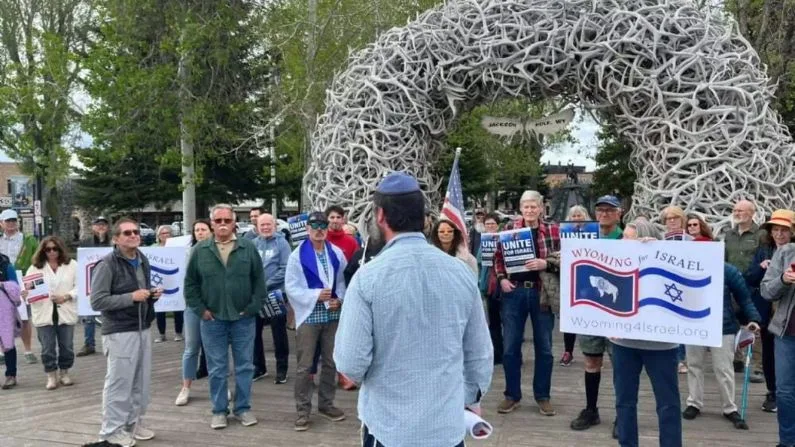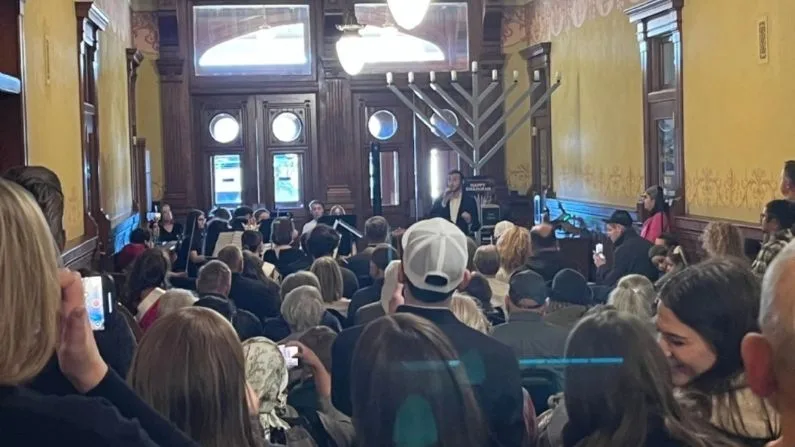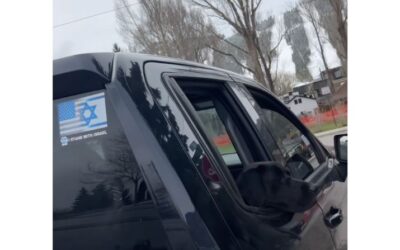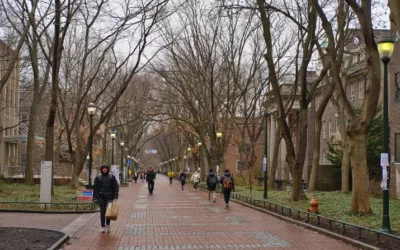Make our newscast part of your daily listening routine. Subscribe on Spotify (or wherever you listen to podcasts).
Wyoming only has about 2,000 practicing Jews. And according to the Anti-Defamation League, the number of reports of antisemitic incidents in the state has jumped nearly 42% from 2023 to 2024.
Wyoming Public Radio’s Corwin Schlump spoke with Chabad Rabbi Zalman Mendelsohn about the experience of being Jewish in the state. Mendelsohn opened the Jewish community center in Jackson in 2007 when he moved to the state.
Editor’s Note: This story has been lightly edited for brevity and clarity.
Chabad Rabbi Zalman Mendelsohn: At that time, there were approximately 500 Jewish people who lived in Jackson. Many of whom were requesting a full time rabbi. At that time, when I moved, there wasn’t a full time rabbi in the state of Wyoming.
Corwin Schlump: So right now, there are three rabbis in Wyoming?
ZM: Right now, there are three. I believe we’re on our way down to two. We have intentions of opening up more Chabad Jewish community centers in Wyoming, so we expect to have more Jewish leadership in the state of Wyoming.
Corwin Schlump: And what’s the philosophy behind the Chabad Lubavitch? What’s the history of them?
ZM: Great question. So Chabad is about 250 years old. It was started by Rabbi Schneur Zalman of Liadi. It started in white Russia
Chabad is an acronym for three Hebrew words: Chachma, Bina, and Daas, which means wisdom, understanding, and knowledge. And the idea is to not just have an experiential Judaism or an emotional Judaism or a social Judaism or a cultural Judaism, but to have an intellectual one where you understand and debate and deeply integrate the ideas and the wisdom and the values of Judaism in an intellectual capacity.
There are now some 5,000 Chabad Jewish centers around the world, in over 100 countries, in all 50 states. And each of them operate under the same philosophy of creating a space of intellectual Jewish rigor and ideas and values based on the wisdom of the Torah, a 4,000-year-old tradition, and a space where love and inclusivity and friendship are of paramount importance.
CS: Are you open to non-Jews coming?
ZM: Absolutely. Many of our programs are open to the broader community. We have Hanukkah events annually that receive many, many people from outside of the Jewish community that participate. We encourage that, but we don’t proselytize. We are not focused on converting non-Jewish people to become Jews. We’re focused on bringing Jewish education and celebration and values to Jewish people who are thirsty for more Jewish opportunities and learning.
CS: And what’s the Jewish experience in life like in Wyoming in general, or at least in your experience?
ZM: It’s been living up to its namesake. The Equality State is real for the Jewish community in Wyoming. The community has welcomed us over the last almost 18 years with open arms. And we’ve seen an incredible outpouring of love and support for the Jewish people, particularly after October 7, [2023].
I travel around the state extensively performing bar and bat mitzvahs and Jewish weddings and, unfortunately, funerals, at times. And so I see people from every walk of life in every nook and cranny around the state. One of the things that we have a very good sense of are the hearts and kindness of the people of the state of Wyoming – the most welcoming, kind and loving people who have embraced us with open arms.
We watched all of the outrageous support for Hamas come up on campuses around the world, and people chanting all kinds of genocidal remarks against Jewish people all across the country, and we were terribly disturbed around the world. But in Wyoming, we witnessed something very different. Thousands upon thousands of people writing, “Wyoming stands with Jews”, “Wyoming stands with Israel”, and sending us letters and walking to our home and to our place of worship and putting out flowers and putting out chocolates and letting us know that they stand with us.
The heartwarming response that we experienced was just enormously cathartic and loving and gave us the courage and the strength to continue doing the work that we do.
CS: Have you ever experienced antisemitism in Wyoming?
ZM: Yes, I have. Several years back, I remember that April very clearly; it was very disturbing when I was called by a member of our community that somebody had spray-painted swastikas on the signs of the entrance of a state park. But the police right away took notice of it, and they promised that they would investigate, and they did.
Recently, there was a bullet hole that we found in the synagogue in Cheyenne. We haven’t yet been able to identify what the cause was, but it’s very worrisome for us. We don’t know if it was a mistake or an accidental discharge or an act of hatred, but we do want to get to the bottom of these things.
We will not, at any point in time, cower in fear. We will stand tall and proud of our tradition. And we know that the vast majority of the people in the state of Wyoming accept us. But, unfortunately, every so often, there are people who act with hatred.
CS: Has the Wyoming government done anything to support the Jewish community in fighting antisemitism?
ZM: So there have been quite a few expressions from leadership in the state of Wyoming.
I don’t know how long you’ve been here, but I’ve been through three governors in the time that I’ve been here, and every single one of them have stood together with the Jewish community on Hanukkah. We do an annual menorah lighting and Hanukkah party in the state Capitol building. And as you know, Governor Freudenthal was a Democrat, Governor Mead, a Republican, Governor Gordon, a Republican.
It’s something unique where we have Christians and Jews and people from all walks of life and different religions and different lifestyles coming together in support of the Jewish community every year on Hanukkah.
CS: What’s the interfaith relationship like in Wyoming?
ZM: There are several Muslims that live in Jackson that I have a wonderful relationship with. It’s very important for me to develop authentic, loving, neighborly relations with all human beings.
Sometimes it’s difficult to speak about subjects related to the war in Gaza, related to the war in Lebanon, related to the challenges with Houthis and the challenges of what’s going on in Syria and Iran. Not always is it a comfortable conversation, but we have those conversations too. We do it from a place of respect and love.

A Unite for Israel Solidarity Event at Jackson Town Square to voice support for the hostages still being held in Gaza. (Courtesy of the Chabad Lubavitch of Wyoming)
We do have relationships with others who are from Middle Eastern background, but aren’t Muslim. There’s a great friend of ours who’s a Lebanese Christian who lives in Jackson. We have relationships with Iranians or Persians that live here in the community. Relationships with people from others from Lebanese background, and so, we cherish those relationships.
Every month, we gather in the town square in Jackson in support of Israel and calling on leadership to do whatever they can to release the hostages. And we have so many Christian leaders that join us in that effort and members of the Christian community who stand together with us. And we are deeply grateful for that cooperation and that special relationship that we have.





